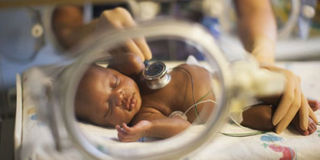Ensure early detection and management of premature births

Ensure early detection, management, premature births
Preterm birth is one of the leading causes of death in children under the age of five worldwide. According to the Ministry of Health, 226,000 babies are born preterm each year.
Of these, 12,500 children, under five years, die due to direct preterm complications. Teenage mothers are at a higher risk of premature births because most of their bodies are not able to carry the baby that long.
According to the World Health Organisation, babies born too early may have more health issues than babies born on time and may face long-term health problems that affect the brain, the lungs, hearing or vision.
Despite the challenges of going through the premature birth experience, premature babies are precious and can be anything in life. They should never be abandoned.
The preterm birth has a mental effect on teen mothers. They keep wondering why they have to stay in the hospital longer after delivery.
They are worried about the feeding experience. This year, we have had two teenage girls giving birth prematurely. The toughest experience was during the initial lockdown when transport was also locked.
We had to find ways to stock premature milk for twins and do several hospital visits.
Teenage mothers face it the hard way because it is an expensive process. Some teenage mothers are in areas without health facilities with neonatal equipment. This risks the life of the baby and the teen mom.
Under our partnership agreement with Rubaga Hospital, all our girls go for teen-friendly antenatal services so that we limit complications that can lead to preterm births. We encourage pregnant teens and their families to ensure antenatal visits are done on time for early detection and management of premature births. Pregnant girls should not go to traditional birth attendants.
Ivan N Baliboola,
Kampala




